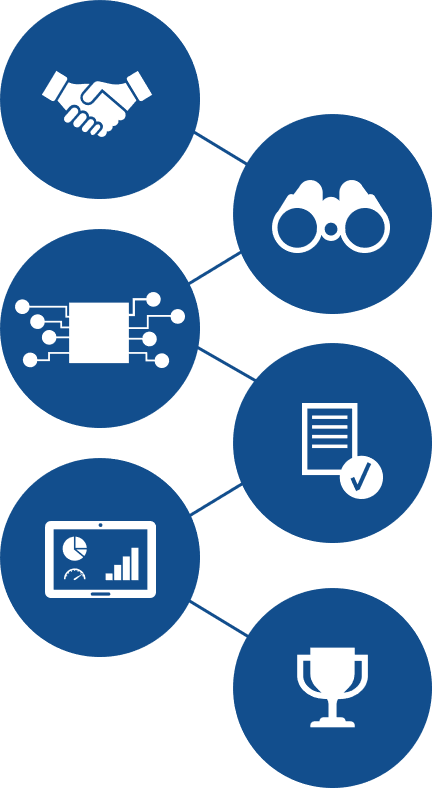Too many KPIs and reports
Little structured data collection
Too late completion of management reporting for timely response
Interpretation of KPIs and derivation of measures on dubious data basis
Lack of future orientation
Too little focus on decisions and actions
High resource commitment for report generation
Additional error-proneness due to manual interventions
Thus, companies may use outdated KPIs or reports. Data sources and data quality are not always transparent. Moreover, companies sometimes use reports for documentation purposes rather than for corporate management. Their creation is sometimes associated with considerable manual effort, as the processes are at most partially automated. Duplicate data storage and different interpretations of KPIs are further factors that undermine the effectiveness of corporate management. New requirements such as the integration of sustainability as a reporting-relevant KPI have mostly not yet been implemented.
Let us work together to quickly and efficiently examine your current processes, identify optimization potential, and directly implement initial quick wins with immediate benefits. Using a holistic approach, we develop a target picture for future corporate management. One of the decisive aspects of this is to validate and further develop the current control parameters. A consistent orientation towards the future, measures and decisions serves as a fundament.
The recommended scope of the Quick Check for Corporate Management is six workshops, each lasting four hours. Depending on the number of KPIs and reports, the workshop concept can also be extended on a company-specific basis.
Creation of transparency about data, processes, roles, control elements and systems
Validation and further development of current company control parameters
Improvement of data and report quality
Enforcing a consistent orientation towards the future, measures and decisions
Identification of optimization potentials and solution approaches
Reduction of costs through the realization of quick wins
Controlling relevance
Influenceability
Data quality and availability
Degree of automation
Clear responsibilities

Future target picture and value drivers (dashboard, BSC, ...)
Analysis of the completeness of meaningful, relevant performance indicators
Evaluation of data availability
Simply complete the form and submit it. We will get back to you as soon as possible.

The rapid pace of the digital age challenges companies to set the right course in order to maintain their position in the long term, even under changed social, economic and technological framework conditions. For the transformation to succeed, new ways of thinking and finding solutions are needed in corporate management.

The lead-to-cash process encompasses all points of contact between a company and its customers − from initial contact and qualification, through the purchasing process and order processing, to the provision of services and invoicing. We support companies in mapping their customer-related processes holistically and digitally.

Data governance ensures that data is managed and maintained in a uniform and disciplined manner. It defines clear responsibilities, establishes data ownerships, ensures a stringent security concept, and designates clear roles that are responsible, for example, for compliance with data quality and implement the strategic requirements from a technical perspective.